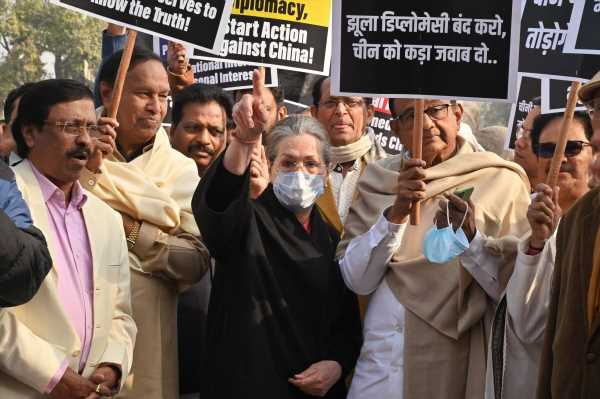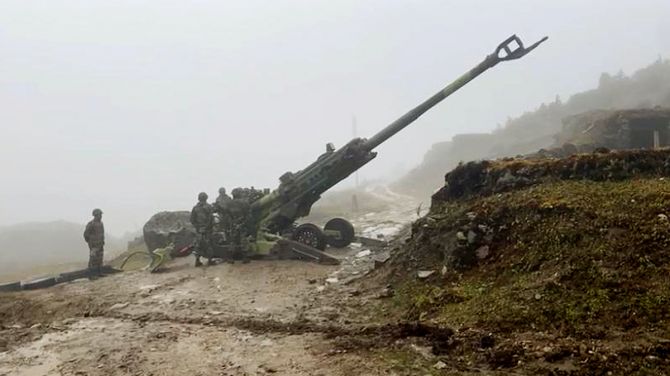The Chinese aren’t after territory.
Their target is our national will, morale and the sense of autonomy we feel in making our strategic choices.
They are attacking India and the Modi government at their weakest point, asserts Shekhar Gupta.
What are the Chinese up to?
Why is it that they are provoking Indian troops and thereby public opinion by activating almost the entire 3,488 km Line of Actual Control, and yet managing the escalation ladder below the firing threshold?
What is their message and objective?
Finally, how are we responding to it?
Not militarily. That isn’t the question right now. India’s armed forces are dealing with this adequately and effectively on the ground.
This can’t, however, be seen as a series of whimsical, sporadic fistfights or melees on a most lonely frontier.
We need to understand what the Chinese are after. If it were territory, they wouldn’t eschew the use of firearms.
They might then try using some of their remote weaponry to try and achieve their territorial objectives with minimal, if any, human casualties.
Would they do this only to ‘rationalise’ the territory along the LAC and create buffer zones, as has been done in Ladakh? They would have to be nuts to employ nearly three divisions and heavy equipment at 15,000 feet and above in the most hostile environment for just this.
This won’t enhance their security, improve their access to resources, or weaken India’s will to defend its territory, by fire if it comes to that.
Yet, almost all the debate in India thus far on China’s actions has been about territory.
Prime Minister Narendra Modi — who is careful never to name China — spoke on the issue only once, in 2020.
This was his much-quoted, ‘Koi nahin aaya… (nobody’s come in, nobody’s squatting on our territory, no post of ours has been occupied)’ statement.
The criticism from the Opposition, and critics within the strategic commentariat, has all been about territory.
Even as this column is being written, I see news headlines running Rahul Gandhi’s statement attacking Mr Modi for keeping mum despite what he calls the ‘loss of territory’ to China.
All the other Opposition parties, from the Trinamool Congress to Asaduddin Owaisi’s AIMIM, are talking of territory.
The fact is, none of the actions of the Chinese, their method or subsequent de-escalatory response, suggests that territory on the ground is what they are after.
The territory they most likely want now is in our minds.
They want to throw India off-balance in terms of its military deployments as well as the strategic rebalancing it is been working on for the three post-Cold War decades — a process that picked up generally after the India-US Civil Nuclear Agreement, and got a new push after Mr Modi’s arrival.
The Chinese are delivering multiple, complex strategic and political messages to India.
We do not serve ourselves well by focusing on territory and military-tactical issues instead.
It also speaks very poorly of our political and strategic culture. We need to explore this further.
The side that loses a war keeps re-fighting the same war over and over again through generations.
In our popular imagination, we keep fighting the 1962 War over and over again. As if to reassure ourselves we would do so much better.
The tough truth is, that war was 60 years ago. There have been multiple revolutions in the world since then.
Geopolitics has changed, the Cold War is over, China has changed and, for heaven’s sake, India has changed.
There have also been serial revolutions in military affairs.
From massed mechanised power to cyber warfare to drones, robots, and minimisation of human contact.
If our popular imagination is still trapped in defending the border outposts (chowkis) as in 1962, I dare say the same mindset prevails in our strategic and political universe, too.
That’s why the Opposition has launched a single-focus attack over the ‘loss of territory’ or patrolling rights.
Even if somewhat indirectly, this same dated thinking is also why the Modi government is shy of allowing a discussion of the crisis in Parliament.
If it’s about slivers of land or patrolling rights, it’s impossible to settle an argument in domestic politics conclusively unless you’re willing to disclose where you were, and where you are.
Both of these can be problematic and counter-productive. Why, I’d rather not go into at this point.
What the discussion should be about — the larger political, strategic, and geopolitical dimension — is something the political environment isn’t prepared for.
The BJP is shy for two reasons. One, politically, it’s loath to see the prime minister’s record on national security being questioned or debated in public.
He’s their only vote-getter. A more muscular approach to national security than ever before in our independent history is projected as his most important Unique Selling Proposition.
Xi Jinping has decided to dent it periodically.
The second reason is also political, though not partisan.
The nuances that today’s global power rebalancing calls for, the game India is playing, the sensitivities involved, would call for a quality of debate that simply isn’t expected.
It isn’t as if our political class lacks maturity. Most of the key Opposition leaders have been there, done that.
They understand national security and fast-changing global equations. It’s just that there simply isn’t enough trust between them and the ruling party.
Never in the eight and a half years since a fully-majority government was sworn in under Narendra Modi has it taken the Opposition into confidence, even behind closed doors on sensitive issues of national security.
This broken politics has become India’s greatest strategic vulnerability. This breach in India’s defences is what the Chinese are targeting.
They do not want any loss of life. The mutually fatal clash at Galwan, if anything, has been the biggest failure of their strategy in the past two years.
See the pattern of their conduct. Every few months, they will do something to embarrass India, Narendra Modi personally, and confuse Indian strategists.
The latest two provocations — the clash in the Tawang sector and the cyber-crippling of the Indian State’s most significant centre of medical science and education, the All India Institute of Medical Sciences — have come just as Exercise Yudh Abhyas with the US has concluded.
If India was making a point by holding this exercise with its Quad partner in a Himalayan zone abutting Tibet, the Chinese have come back at us saying it’s a game two can play. A symbolic move countered by a more damaging one.
This pattern will continue. The Chinese aren’t after territory.
Their target is our national will, morale and the sense of autonomy we feel in making our strategic choices.
They are attacking India and the Modi government at their weakest point. Our broken politics.
It forces the government to not come clean to the people or Parliament, and the more it feels compelled to stay mum, the more territory the Chinese get.
Not in the wastes of Ladakh or Arunachal, but in our political mainland.
Narendra Modi and his government have to begin shoring up India’s defences by mending the political equations at the top, by treating the Opposition with respect, and by sharing confidences with them so India can speak as one.
If you read all the most respected books on 1962, you will see that it was angry debates in Parliament, condemnation and shaming that pushed Nehru into a war he knew he was going to lose.
The critics shaming him weren’t all from the Opposition. There were many from his party, even in his Cabinet.
One of the key lessons from 1962 was also the need for better, more mature, more mutually-trusting politics.
That’s the priority now while the armed forces do their thing quite effectively.
By Special Arrangement with The Print
Source: Read Full Article




